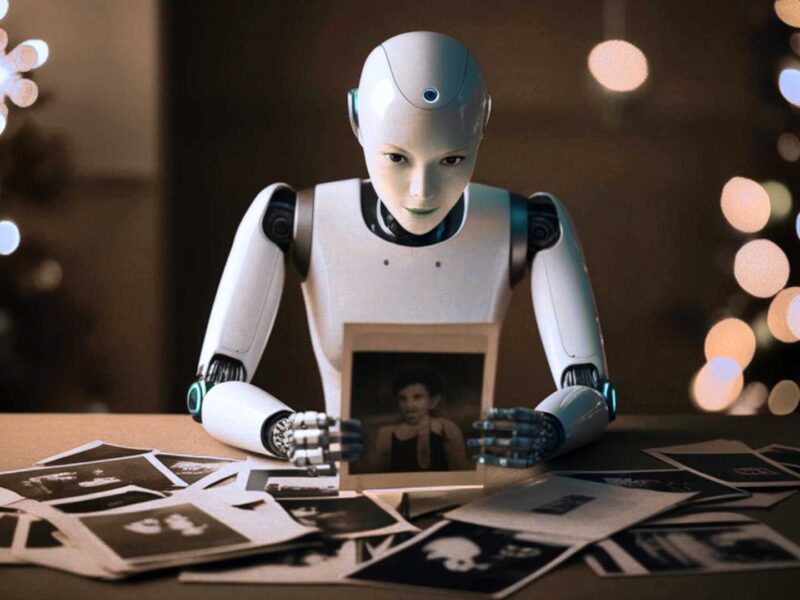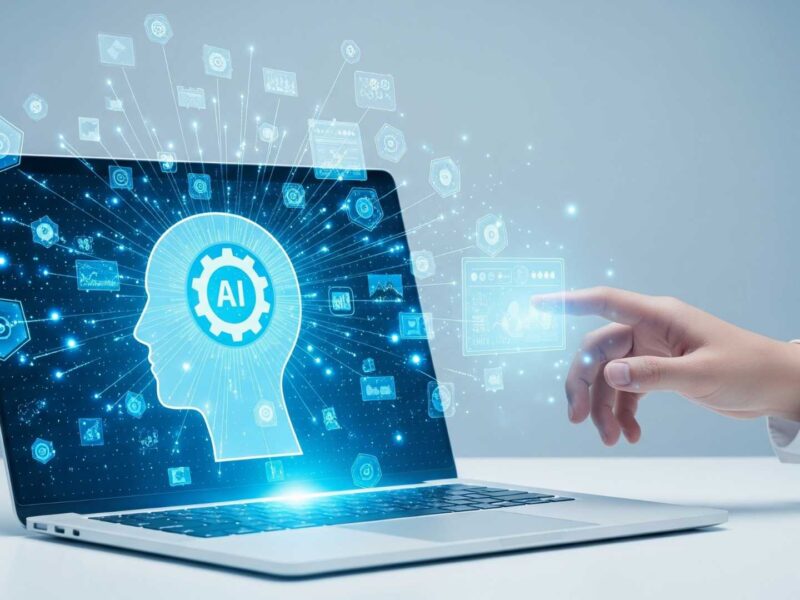Jobs AI Can’t Touch: Predictions from Tech and Thought Leaders
As AI transforms industries, certain roles remain anchored in uniquely human skills, resisting automation’s reach.
This Techronicler article gathers insights from business leaders, thought leaders, and tech professionals on jobs in their organizations or industries that AI hasn’t impacted and are expected to stay unaffected.
From brand voice development to executive recruiting and hands-on technical work, these experts highlight roles requiring emotional intelligence, nuanced judgment, and creative intuition.
Their insights reveal why human-centric skills like trust-building, cultural alignment, and contextual decision-making ensure these roles endure, offering a roadmap for understanding where human expertise remains irreplaceable in an AI-driven future.
Read on!
AI is Another I: A Cognitive Extension
As AI becomes deeply integrated into our daily work and lives, I’ve come to realize how much it still relies on us—on human judgment—to make decisions, choose frameworks, weigh tradeoffs, and define what good even means in software.
Sometimes I think maybe I should treat and train my AI tools as a version of myself. When I’m responding to a message and can’t quite find the right words, AI often helps me articulate exactly what I mean. It feels like AI is becoming “Another I”—a cognitive extension rather than a replacement.
That insight is also what drove me to build my own AI-powered SaaS tool, YTtoMermaid—a product that turns YouTube videos into visual mind map diagrams. It came from a real moment: my husband once asked if there was a way to visually summarize a one-hour Zoom replay. I realized this wasn’t just a UX challenge, but a human one—how do we distill chaos into clarity?
AI is a collaborator. It’s not doing the work for us, but with us. It reflects back our limitations, our intentions, and our blind spots.
That’s why I think Elon Musk’s vision of colonizing Mars isn’t a failure in engineering—but in imagination.
Even if we had the tech to send 8 billion people to another planet, we’d bring the same old problems: inequality, shortsightedness, and greed. New soil doesn’t grow new morals. The future doesn’t depend on better planets. It depends on better people.

Xian Li
Founder, Mermaid Minds
Policy Compliance Leaders Are Vital
One role in cybersecurity that remains largely untouched by AI—and is likely to stay that way—is cybersecurity policy and compliance leadership.
This position requires more than technical expertise; it demands a deep understanding of evolving regulations, business priorities, and ethical considerations. While AI can assist with monitoring compliance or identifying risks, it lacks the judgment to interpret complex legal frameworks or make strategic decisions aligned with organizational goals.
These leaders must navigate nuanced conversations with regulators, executives, and legal teams, often making decisions where the “right” answer isn’t clearly defined. Their ability to weigh risk, context, and long-term impact is something AI can’t replicate.
As cybersecurity becomes more entangled with business strategy and global policy, the human insight and discretion this role requires will continue to make it indispensable.

Gyan Chawdhary
Founder & CEO, Kontra
Financial Management Skills Demand Human Expertise
In the freelance virtual assistant industry, especially in accounting, AI has not significantly affected the role of personalized financial management and advice.
While AI tools can handle tasks like data entry, creating basic reports, and simple calculations, they cannot grasp the unique financial situation of each client’s business.
A freelance virtual assistant who manages accounting tasks does more than just numbers; they provide customized advice, spot potential financial issues, and help clients make decisions based on their specific goals.
This role also involves understanding local tax laws, compliance rules, and keeping up with government regulation changes since these tasks require critical thinking and flexibility.
In the Philippines, many accounting virtual assistants are valued for their careful work, confidentiality, and cultural understanding, which help build strong relationships with clients.
These human qualities and strategic skills make this role essential and unlikely to be replaced by AI, even as technology advances.

Kharla Denura
Freelance Virtual Assistant
Human Oversight Steers Creative AI
I’ve noticed that even as generative AI gets good at creating visuals, experienced designers like logo specialists, graphic designers, creatives, etc will remain indispensable.
In fact, firms like Adobe report that 79% of companies plan to boost investment in creative teams over the next two years precisely because human oversight is critical to steer AI’s output. (here is my source https://business.adobe.com/resources/sdk/state-of-creativity-report-2024.html)
No algorithm can replicate the nuance of a designer’s instinct for brand narrative or the way they tweak a concept until it truly clicks. And as society grows more comfortable with AI, I expect policymakers will step in to safeguard those uniquely human roles, even ones that AI could technically replicate.
Ultimately, creativity isn’t just about generating images; it’s about making meaning, and that will always call for a human touch.

Dawson Whitfield
CEO & Co-Founder, Looka
EV Battery Technicians Remain Essential
If you’re talking about electric vehicles, AI has little say on one of the last remaining human jobs – technician battery repair and replacement. Even with the aid of AI for diagnostics and predictive maintenance, the nuts-and-bolts work requires an intimate understanding of battery systems, meticulous troubleshooting, and yeoman’s manual labor that can never be fully automated.
As EV technology marches forward, battery and charging system maintenance will become more intricate and, as a result, require more-skilled human technicians. These employees “fix things that are broken” and also “inspect a vehicle” to ensure that it is safe to drive, in ways that only the human touch can.
As long as Al has such a large hand in the automotive industry, there will always be a place for this cheap labor force, no matter how automated it gets.

Rob Dillan
Founder, EV Hype
Building Deep Client Trust Requires Human Connection
Some jobs remain totally immune to AI: deep client relationship building among them.
While, say, onboarding emails can be automated or Zoom calls can be summarized, it cannot build trust, discern unspoken tension among its human subjects, or adapt to the nuance of human partnership in high-stakes work.
In my experience, founders and chief marketing officers never pick agencies solely based on the results-they pick agencies because there is another person who gets their vision, challenges their assumptions, and helps them work through the uncertainty.
That level of emotional intelligence negotiation, and strategic trust-building cannot be replicated by any AI prompt or chatbot.

Anatolii Ulitovskyi
Founder, UNmiss
Executive Search Requires Human Judgment and Trust
I’m with the recruiting firm Summit Search Group, which has given me front-row seats to how AI has reshaped roles across industries.
The technology has certainly started to influence the recruiting industry, as well, but I see some roles that are relatively unaffected and I believe will remain so for the foreseeable future.
One in particular that AI hasn’t significantly impacted is the role of headhunter or executive recruiter.
While it’s true that AI tools can streamline the process of sourcing, screening, and reaching out to candidates, executive search is heavily relationship-driven and requires nuance that AI cannot yet achieve.
Senior hiring isn’t just about qualifications on a resume. Factors like cultural alignment, strategic long-term vision, leadership style, and interpersonal skills are just as critical for success, and those are areas where AI still struggles to make accurate assessments.
Clients trust executive recruiters to understand their strategic goals and serve as advisors throughout a high-stakes hiring process.
AI can help by providing data, but ultimately the judgment, trust, and human connection involved in executive search aren’t replaceable by technology.

Matt Erhard
Managing Partner, Summit Search Group
Technical Account Managers are Irreplaceable
In my view, deeply relationship-driven roles like Technical Account Management (TAM) will remain less impacted by AI. While AI can automate tasks like ticket triaging, reporting, or even initial troubleshooting, the human element of building trust, understanding nuanced customer needs, and navigating complex stakeholder dynamics is something AI can’t fully replace.
Customers don’t just rely on TAMs for answers—they rely on us for strategic guidance, empathy, and the ability to translate technology into meaningful business outcomes.
AI will continue to augment our work, but the core relationship and advocacy aspect of this role will always need a human touch.

Khushbu Shaikh
Principal Technical Account Manager, Twilio
Brand Strategy Needs Human Intuition
One role that AI hasn’t really touched is high-level brand strategy.
While AI can analyze data and even suggest creative ideas, it can’t capture the emotional intelligence and real-world intuition needed to shape a brand’s voice and long-term vision.
Strategy often comes down to subtle cues, market awareness, and reading between the lines, things machines just aren’t wired to do.

Jared Bauman
Co Founder & CEO, 201 Creative, LLC
On behalf of the Techronicler community of readers, we thank these leaders and experts for taking the time to share valuable insights that stem from years of experience and in-depth expertise in their respective niches.
If you wish to showcase your experience and expertise, participate in industry-leading discussions, and add visibility and impact to your personal brand and business, get in touch with the Techronicler team to feature in our fast-growing publication.











